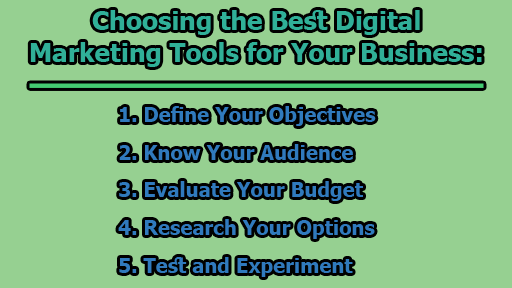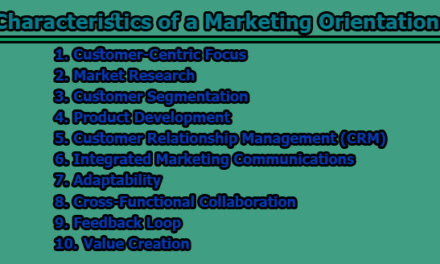Choosing the Best Digital Marketing Tools for Your Business:
In the ever-evolving landscape of digital marketing, choosing the right tools to navigate the complex terrain can be a daunting task. With a multitude of options available, it’s vital to make informed decisions that align with your goals, budget, and target audience. In this article, we will provide you with essential strategies and tips to help you choose the best digital marketing tools for your business.
1. Define Your Objectives: Before delving into the vast array of digital marketing tools, it’s imperative to have a clear understanding of your objectives. What do you aim to achieve with these tools, and how will you measure success? Key performance indicators (KPIs) and return on investment (ROI) should be clearly defined. It is equally important to align your digital marketing strategy with your overall business objectives. By establishing clear goals, you can narrow down your options and focus on the tools that are most likely to help you reach them.
2. Know Your Audience: Understanding your target audience is another crucial factor in selecting the right digital marketing tools. Who are your potential customers? Where can they be found online, and what are their preferences and behaviors? To effectively engage with your audience, you need to know how they interact with your brand and what their pain points, challenges, and goals are. Segmenting and personalizing your messages to cater to their needs is essential. By gaining deep insights into your audience, you can choose tools that will facilitate connection, engagement, and conversion.
3. Evaluate Your Budget: Budget constraints play a significant role in tool selection. Determine how much you can allocate for digital marketing tools and balance quality and cost-effectiveness. Prioritize your expenses based on your specific requirements and expected returns. Tracking and optimizing your spending and revenue will be crucial in ensuring that your budget remains on track. Evaluating your budget will enable you to select tools that align with your financial constraints and expectations.
4. Research Your Options: Once your objectives, audience, and budget are well-defined, it’s time to research your options. A wealth of information is available from various sources, including blogs, podcasts, webinars, forums, social media, and online courses. You can also seek recommendations and feedback from peers, mentors, or experts in your field. This research phase allows you to gain valuable insights into the features, benefits, drawbacks, and best practices of each tool, aiding in your decision-making process.
5. Test and Experiment: Ultimately, the best way to choose the ideal digital marketing tools is through testing and experimentation. Most tools offer free trials, demos, or samples that allow you to assess their suitability before making a commitment. Utilize analytics and data to measure the performance and impact of these tools on your digital marketing goals. By experimenting with different tools, you can determine which ones work best for your business.
In conclusion, choosing the right digital marketing tools is a pivotal decision that can significantly impact the success of your marketing efforts. By defining your objectives, understanding your audience, evaluating your budget, researching your options, and engaging in experimentation, you can make well-informed choices that will drive your business forward. Keep in mind that the digital marketing landscape is dynamic, so be prepared to adapt and refine your toolset as your business evolves and grows.

Library Lecturer at Nurul Amin Degree College










